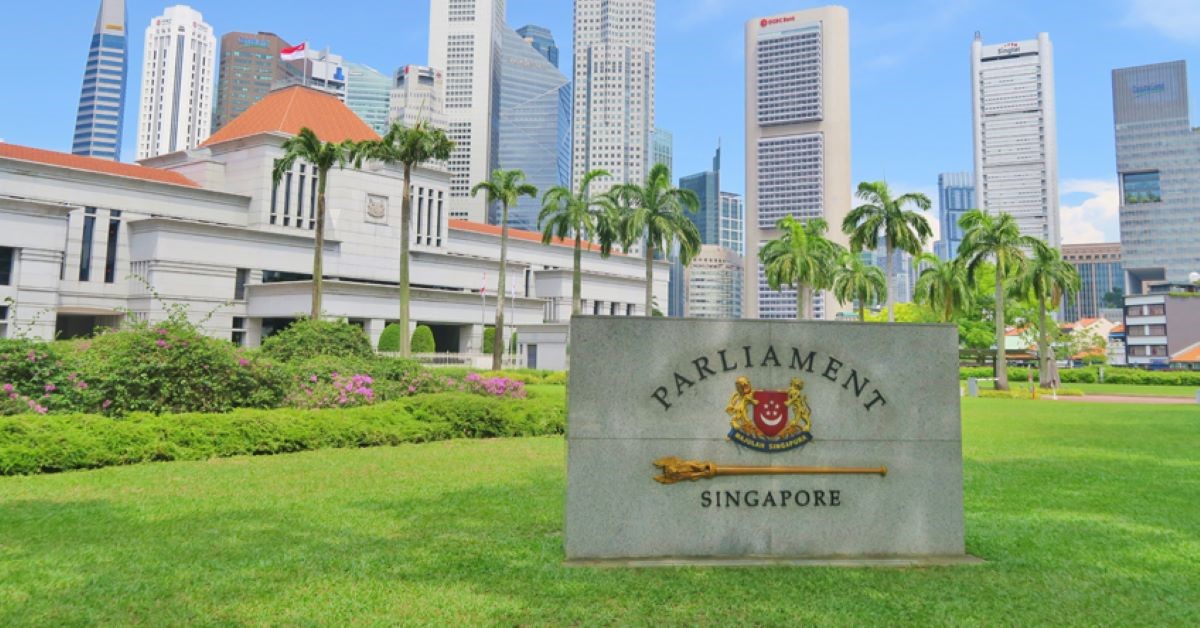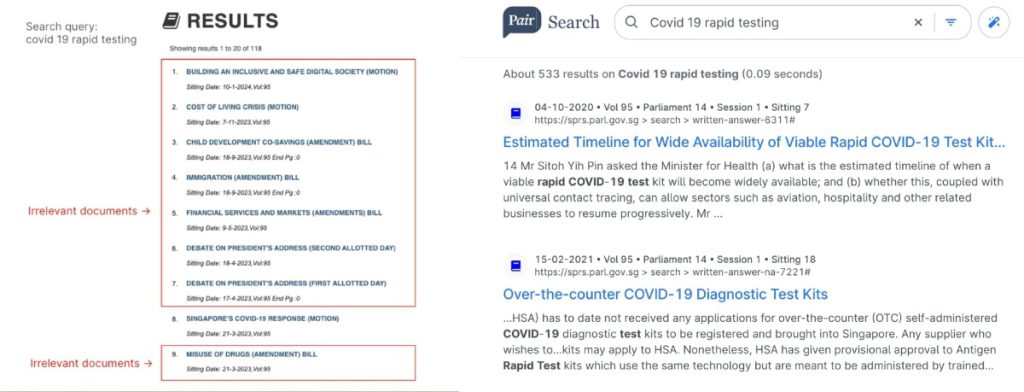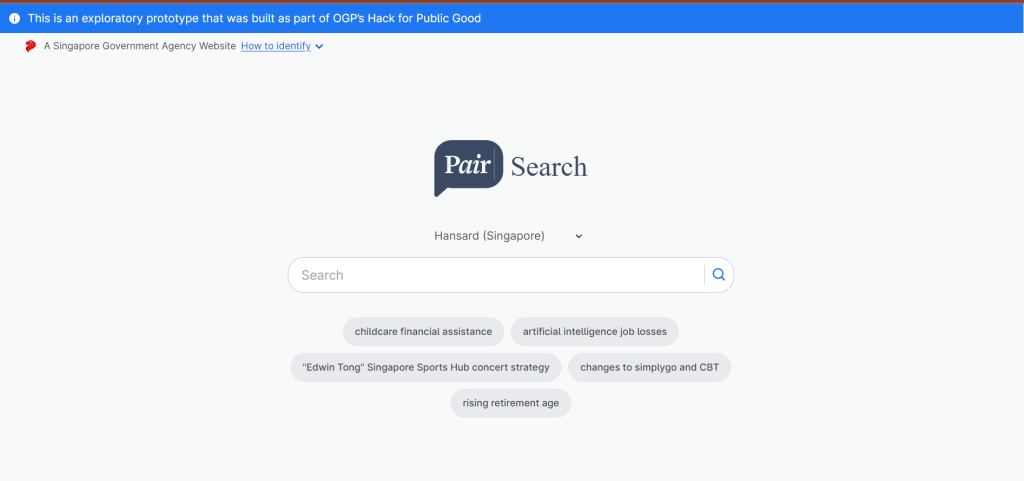S’pore govt unveils AI-powered search engine to provide easier access to Parliament records
Pair Search is touted as a more accessible version of Hansard and LawNet, platforms where you can read past Parliament reports.

The Singapore government’s experimental development arm, Open Government Products (OGP), has launched Pair Search, an artificial intelligence (AI)-powered search engine that aims to give Singaporeans easier access to parliamentary records.
According to a news report by The Straits Times, the website is powered by a large language model (LLM)—the same technology behind the mainstream generative AI platform ChatGPT. It also lets its users sift through case judgements from the High Court and Court of Appeal.
Oh Chin Yang, a senior software engineer at OGP, shared that early test results on their prototype search engine have been “encouraging”.
He added that the concept of Pair Search was conceived at OGP’s annual hackathon, with the team wanting to leverage the advancements in natural language processing and information retrieval to create a more effective search tool for both public officers and citizens.
“The best public policy decision and debate is an informed one, and that starts with search,” he told The Straits Times.
Since its soft launch at the start of 2024, 84 per cent of all users who clicked on at least one search result found their searches within the first 10 results shown to them.
As of April, the site had about 2,700 users and 8,300 search queries.
Pair Search is an upgrade from the current “difficult and unintuitive” search engine
Searching for parliamentary records online was once considered a costly and arduous endeavour.
In 1996, the Singapore government introduced LawNet – a legal research portal that gives its users access to Parliament sitting reports. However, access came with a price as users had to register an account with the portal and pay a S$8 fee monthly.
This changed when the government introduced Hansard, which provided free online access to Parliamentary debates in 2000. However, it was limited to reports from the current term of Parliament, and the cost to access older records had risen to S$30 per hour.
The introduction of Pair Search is touted as an upgrade from the platform, which is “difficult and unintuitive” to use, according to the Pair Search team on the OGP hackathon’s website.
As the search engine is fully keyword-based, House debates that frequently mentioned a single word in the query were often ranked higher than more relevant results.
 Hansard vs Pair Search results for “Covid-19 rapid testing” / Image Credit: Hack for Public Good
Hansard vs Pair Search results for “Covid-19 rapid testing” / Image Credit: Hack for Public Good For instance, the team found that searching for “Covid-19 rapid testing” using the Hansard search engine produced eight irrelevant documents as the top result.
On the other hand, all of the top 10 results generated by Pair Search were relevant to the query.
According to the team, Pair Search uses a combination of advanced keyword matching and contextual search that aligns with the user’s intent. Simply put, the user can receive relevant results without any matching keywords.
Like any modern search engine, the new tool also gives users snippets of each result. In addition to being sorted chronologically, search results can also be sorted by relevance.
Pair Search has incurred an infrastructure cost of less than S$2.7K since its inception
 Pair Search’s existing interface / Image Credit: Pair Search
Pair Search’s existing interface / Image Credit: Pair Search As the Pair Search platform is still at its prototyping stage, continuous improvements have been made since its initial introduction. The search algorithm was last enhanced on April 24 to better understand parliamentary debates at both the paragraph and report level, the latter typically covering a full day’s sitting.
While it meant that reports that may not be relevant as a whole, those with sections that are highly relevant to the search query, will be ranked more highly, resulting in better search results.
Oh added that the infrastructure cost incurred since Pair Search’s inception at the beginning of 2024 has been less than US$2,000 (S$2,700) a month. The Pair Search team comprises one engineer, supported by a designer, and a product manager from the broader Pair team.
Moving forward, the Pair Search team aims to transform the basic search engine into a more robust research tool and is looking to make further enhancements. This includes the possibility of the site proactively suggesting content based on users’ search behaviour.
Furthermore, the team is developing additional features, such as a summarisation function that utilises AI to extract key information into a concise explanatory paragraph based on the search terms used.
The Parliament spokeswoman has also responded to queries on plans to merge the two search platforms, run them simultaneously, or sunset the older one, stating that it has not been decided, given that Pair Search is still a prototype. “Future plans will be subject to developments in the IT landscape,” she said.
Pair Search is part of the public service’s AI software suite
Apart from Pair Search, the Pair team is also currently working on several other related LLM-based projects for public officers, which include:
Pair Chat – a secure version of ChatGPT Pair Intern – an e-mail-based LLM assistant Pair Noms – an automated meeting minutes generatorAs of now, only Pair Search is available to the wider public.
The launch of AI-powered projects aligns with the Singapore Government’s aim of becoming “a leader in the field of AI” and using the technology “for the public good.”
Most notably, DPM Lawrence Wong announced the National AI Strategy (NAIS) 2.0 in December last year to spur the city-state’s efforts in integrating AI.
GovTech has also noted that by leveraging on AI, it can propel the public sector to “keep up with the times” and “remain world-class.”, in preparation for a future where AI is a “fundamental skill.”
Featured Image Credit: Parliament of Singapore

 MikeTyes
MikeTyes 
































